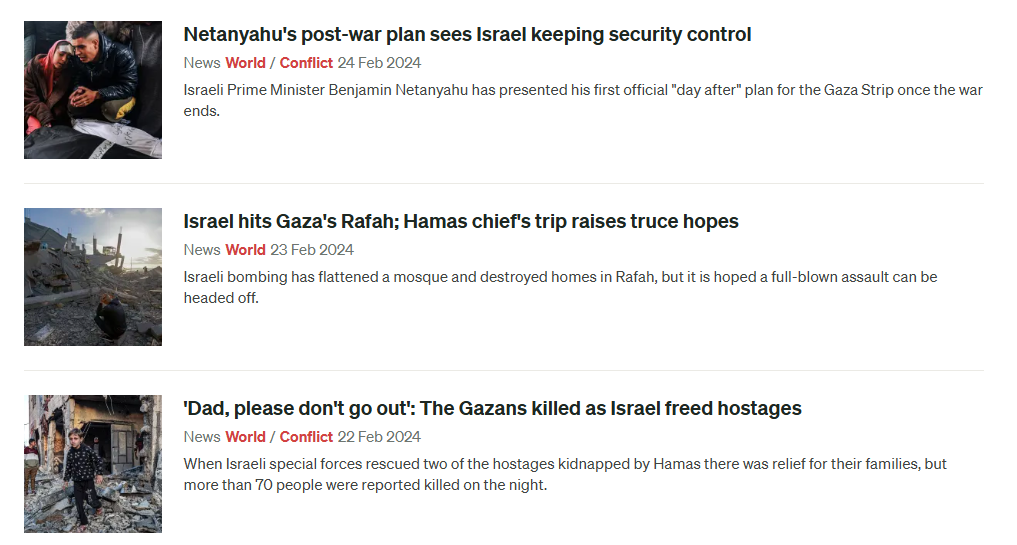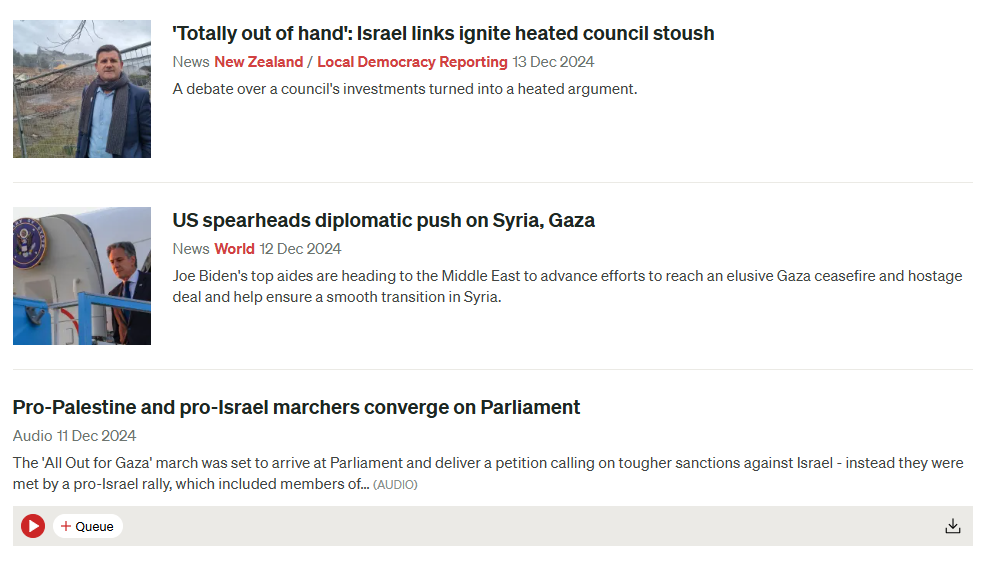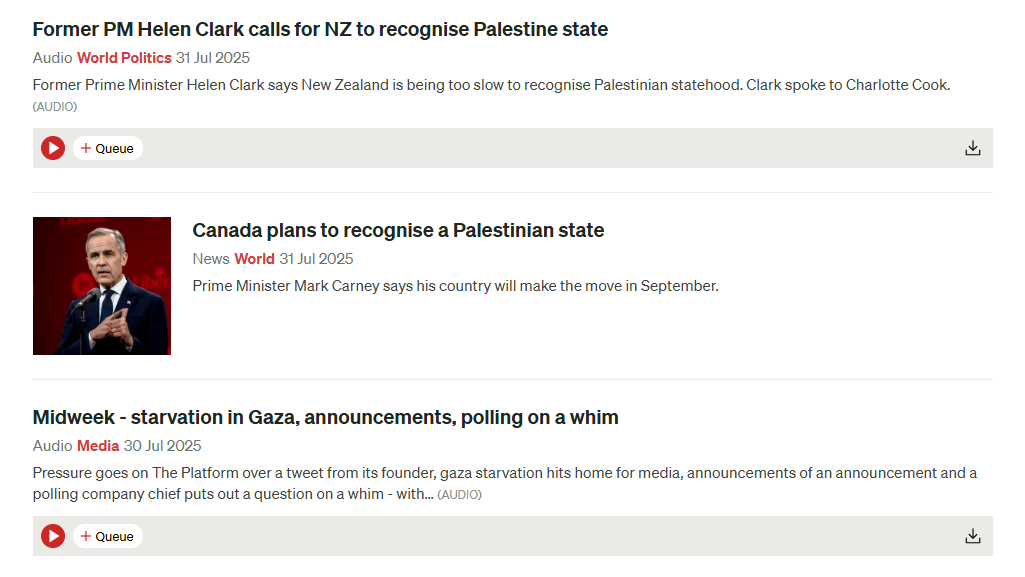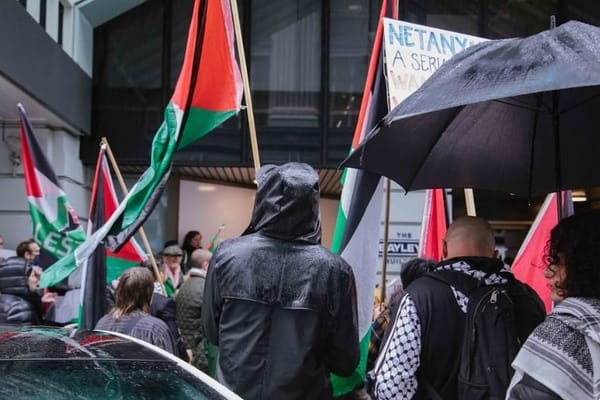The arc of history is long. Does it bend towards 'balance over time'?
The public broadcaster quiet quits its obligations under the Official Information Act


On 28 January 2024, I sent a request to RNZ under the Official Information Act (OIA) asking for information underpinning its editorial decisions about coverage of the genocide in Gaza. After five hundred and fifty-one days of back-and-forth, follow-up requests, an investigation from the Ombudsman and months at a time of ‘radio silence’, I received a proper reply from RNZ earlier this week.
The answer: the dog ate his homework.

How did we get here?
In order to get a proper sense of the farcical nature of this latest response, I have laid out the timeline in full below.
Note that under the OIA, agencies have a statutory obligation to respond to requests as soon as reasonably practicable and no later than 20 working days after the date of receipt:
- 28 January 2024 - I send my initial request to RNZ
- 27 February 2024 (exactly 20 working days later) - RNZ sends its initial response.I have laid out both my request and RNZ’s responses (in bold) below:
I would like to request the following under the Official Information Act.
Any internal correspondence (email, messaging apps and records of meeting) relating to Radio NZ's coverage of Gaza between 8 October 2023 and 28 January 2024, including, but not limited to:
- 4 March 2024 - I send a follow-up request with input from subject matter experts who helped me craft the wording to be more exhaustive. This request was much longer so rather than repeat it here in full, you can view it on FYI.
- 2 April 2024 (exactly 20 working days later) - I receive a two-sentence response:
Apart from the attached email guidance, RNZ holds no other information in relation to your request below. RNZ notes that there is no such thing as an “Radio New Zealand editorial board” as quoted in your request.
The fact that RNZ held such limited information was surprising to me, so I escalated my complaint to the Ombudsman. I also went back to RNZ to clarify on what grounds it was declining my request:
- 1 May 2024 (exactly 20 working days later) I receive the following response:
In short we have not denied your request as we have sent you the information we hold.
23 May 2024 - The Ombudsman acknowledges my complaint and says that it is awaiting allocation to an investigator.
30 August 2024 - The Ombudsman acknowledges my complaint and says that it is awaiting allocation to an investigator.
10 December 2024 - The Ombudsman acknowledges my complaint and says that it is awaiting allocation to an investigator.
14 March 2025 - RNZ releases a report, written by a former employee, finding that there is "no reason for concern" that it is breaching journalistic standards in its coverage of the Gaza genocide. I am surprised that a report could have been written based on information I had been told doesn’t exist. I refer to this document below as ‘the March report’.
21 May 2025 (just under a year after the original complaint) - the Ombudsman contacts me again saying they are still looking at allocating my complaint to an investigator but want to check whether I still want to pursue my complaint. I immediately respond ‘yes’.
30 May 2025 - the ombudsman emails me to confirm an investigator has been assigned to the complaint.
4 July 2025 - I receive a letter from the Office of the Ombudsman confirming that it will investigate the matter, focusing on the following details:
RNZ’s handling of your requests, including its interactions with you, and
the adequacy of its response and whether it was justified in saying it had sent you all the information it held in relation to the requests.
30 July 2025 - I receive a response from RNZ, saying that it is “unable to explain the thinking” behind the initial correspondence because the guy responding to my request no longer works there (oops!) However, RNZ helpfully included two guidance documents on ‘Middle East Conflict reporting’ that were developed following the March report. I have attached a copy of both here:

A culture of opacity
I am still waiting on the Ombudsman’s response to RNZ’s latest email but I can’t imagine they’ll look kindly on the correspondence I received throughout the period. Putting aside the fact that RNZ has routinely engaged in genocide denial since 7 October 2023, its responses to my request were evasive, insufficient and consistently pushed against the statutory 20-day window. Nothing about that suggests ‘good faith’. Rather than the “open and non-defensive attitude” cited in the March report, this is the public broadcaster dabbing on those concerned with its editorial decisions.
The attitude is completely consistent with my own observation of ubiquitous hostility towards members of the public requesting information from the public sector. One of the key factors that led to my decision to leave the sector was a Deputy Chief Executive approaching my desk and loudly telling me to not put information in an email to him because it would be subject to the Act3. I got the sense that the former Complaints Coordinator at RNZ, like many senior public servants, hates the public.
The idea that organisations don’t take the OIA seriously is not just my own crank opinion. Peter Boshier, the outgoing Chief Ombudsman, had scathing things to say in March about organisations taking the piss out of the Act. Speaking about HNZ, Boshier suggested that agency Chief Executives be held personally responsible for breaches.4

Meanwhile, the genocide goes on
The worst thing about RNZ’s ongoing disdain for its obligations under the OIA is that its wheel spinning continues to distract from its coverage of the ongoing genocide: the whole reason behind my initial request 551 days ago.
RNZ’s ‘Middle East Conflict Guidance’ does seem to address some of the more egregious concerns people have expressed about its coverage which is in line with the general softening we’ve seen in public discourse over the last couple of months (One Day, Everyone Will Have Always Been Against This). Readers and listeners will be relieved to know that the public broadcaster will no longer “automatically adopt the language used by… the Israeli Defence Force.”
Unfortunately though, it has left the door open for its continued dehumanisation of Palestinians with its stubborn refusal to “alter wire copy from our partner agencies." One of the most blatant ways that RNZ has engaged in genocide denial is by uncritically republishing material from ‘trusted’ western outfits like AP and Reuters and BBC. This is what led to Mick Hall leaving RNZ.
It may seem reasonable at first for RNZ to treat external media organisations as outside the remit of RNZ editorialising but there is still editorialising going on in this policy. There are a number of organisations that RNZ could choose to reprint or re-broadcast, all of which hold varying levels of anti-Palestinian sentiment. Every time there is a ‘newsworthy’ event in Gaza, RNZ has its pick of multiple sources to republish. The decision to choose BBC over Al Jazeera (for example) is an editorial one even if the copy is left intact. That choice has significant implications for the overall tenor of RNZ’s coverage of the Gaza genocide and every time our national broadcaster has been presented with that choice, it has tended towards the more Zionist option.
Even the March report recommended:
a section on the RNZ website discussing the sources it trusts and the reasons for doing so. This could distinguish, for example, between the BBC news operation and its many other programmes, podcasts and web publications.
RNZ rejected this recommendation, saying:
RNZ will take a more transparent approach through the acceptance of other recommendations. However, it would stray into difficult territory if it started to specifically single out and name other outlets, and their merits or otherwise. It would also be challenging to keep such a section updated and fair within the broader media environment.
As RNZ makes performative gestures towards honouring the ‘balance over time’ provision cited in the March report, it still refuses to let go of one of its most useful outlets for dehumanising Palestinians.
Until then, all complaints and OIA requests are just smoke and mirrors.
This refers to Mick Hall who lost his job at RNZ for editing information from international news agencies for humanising Palestinians ↩
This section allows organisations to refuse requests if the “document alleged to contain the information requested does not exist or, despite reasonable efforts to locate it, cannot be found” ↩
Never mind that verbal conversations are also covered by the Act ↩
Funnily enough, the article about Boshier also mentions that RNZ had laid a complaint against HNZ for its lack of compliance with the Act (transparency for thee but not for me!) ↩



